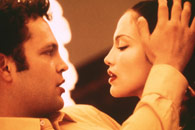

|
| home | movie reviews | features | sov horror | about | forum |
The Cell A-
Year Released: 2000
Many films purport to get inside the heads of their characters, but few do so as breathtakingly as The Cell. Like the ads say, it "enters the mind of a serial killer", using every visual trick to convey a terminal psychopath's twisted inner world. That it does so with such decadent skill comes as quite a surprise, considering that it comes from a first time director handling numerous visual effects. One would expect such a combination to fall flat on its face, instead of delivering the disturbing vision it does. The psychopath in question is Carl Stargher (Vincent D'Onofrio) a schizophrenic with a history of child abuse and a fetish for mechanical dolls. He leaves his victims trapped in an isolated tank, using an automated timer to fill it with water and drown them like rats. The FBI, led by the dogged Agent Novak (Vince Vaughn), eventually catches up with him, but not before a sudden seizure renders him completely catatonic. With a live victim in the still-undiscovered tank, Novak turns to an experimental clinic to help make contact with the comatose killer. The clinic uses high-tech computers to project psychologist Catherine Deane (Jennifer Lopez) directly into Stargher's mind, searching for clues amid still-dangerous clutter of his shattered psyche. The plotline clearly draws its inspiration from recent serial killer films like Seven and The Silence of the Lambs, and the similarities are more than skin-deep. All three films share the same sort of high-contrast cinematography, as well as brooding scores from the same composer, Howard Shore. Then there's the standard thriller stereotypes on display: the dogged investigator, the vulnerable heroine, the almost-loving attention to the killer's modus operandi. But like those earlier films, The Cell isn't content to just unfold an engaging crime story. It delves deeply into the psychological connections between its characters, using the film as a canvas to externalize some very dark corners of the human soul. In some ways, the visuals threaten to work against it. Sure, the special effects are stunning, the makeup is impressive, and the art and costume direction displays an awe-inspiring imagination (there's enough here on eye candy alone to justify a look), but with so much emphasis on visual, The Cell risks losing its cohesion, forgetting the characters in favor of its glorious set pieces. Thankfully, director Tarsem Singh never succumbs to the opulence he has created: he never lets the effects overwhelm their thematic purpose. As Deane moves through scene after scene of Stargher's inner kingdom, the images work to justify and explain the monster he has become. We see the pain of his early childhood in these sets and outfits, the obsessive fixations that drove him to his horrible deeds. The visuals function as an extension of the character, enhancing the human drama rather than overwhelming it. In most films like this, the actors compete with the sets and effects for attention. Here, the performances work in perfect sync with the startling images around them, forming a single piece of a much larger puzzle. Like us, Deane becomes fascinated with the human misery behind the alien landscapes she finds. The tension comes not from the standard killer-in-the-dark clichés but from the very real possibility that she may lose herself in his torment. The actors all exercise as much discipline as their director, and never try to upstage the overall effect with individual histrionics. Have no doubt, The Cell is a scary film, and definitely doesn't cater to everyone. In addition to its serial thriller roots, it reminds one of the works of Clive Barker: strange, horrible and utterly unnerving. But the imagination on display here is undeniable, and Singh marshals it all with uncanny strength. Perhaps the best sign of The Cell's strength is that it could not exist as anything but a film: it defies written description in all of the best ways. Review published 08.25.2000.
|

|
| home | movie reviews | features | sov horror | about | forum |
| This site was previously at flipsidemovies.com from 2000 to 2008. |
|
contact | copyright | privacy | links | sitemap
Flipside Movie Emporium (FlipsideArchive.com)
|